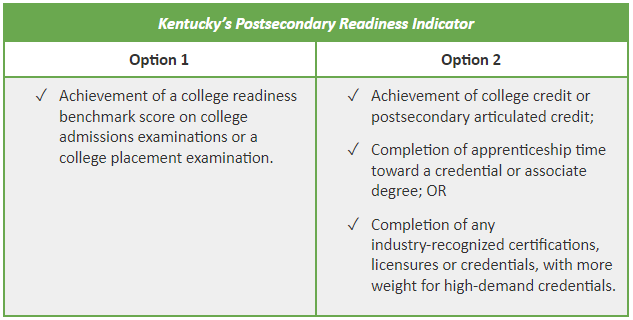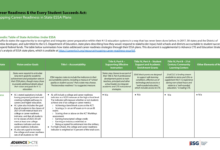Kentucky is regarded as a leader in school accountability and assessment, particularly when it comes to Career Technical Education (CTE). The commonwealth’s accountability system — which was authorized by the legislature in 2009 through SB1 and has evolved and improved since then — was designed to ensure students would graduate college and career ready. Through a weighted point system, the accountability system recognizes schools and districts for meeting college and career readiness benchmarks.
SB1 went into effect in the 2011-12 school year. Under that system, which the Kentucky Department of Education nicknamed the “Unbridled Learning Accountability System,” schools and districts were held accountable for student performance within three dimensions: Next-Generation Learners, Next-Generation Instructional Programs and Support, and Next-Generation Professionals.
Next-Generation Learners, which made up 70 percent of the overall accountability score, measured college and career readiness by counting the number of graduates who:
- Met benchmark scores on the ASVAB or ACT Workeys exams.
- Met benchmark scores on the Kentucky Occupational Skills Standards Assessment.
- Received an industry-recognized credential.
In 2017, Kentucky revised its school accountability system to align with the Every Student Succeeds Act (ESSA). In April 2017, the legislature adopted SB1 (coincidentally the same bill title as the previous accountability legislation) to codify new accountability metrics. Under SB1, Kentucky’s accountability system was expanded to include more robust measures of career readiness. The legislation calls for a “Postsecondary Readiness” indicator that values graduates who:
- Meet college readiness benchmark scores.
- Achieve college credit.
- Participate in apprenticeships.
- Earn industry-recognized credentials.
The legislation also directed the Workforce Innovation Board and the Department of Education to review and vet industry-recognized credentials and publish a list of credentials to be valued in the system.
 In 2020, the Kentucky legislature further amended the state accountability system through SB158 to recognize and value growth. Under the new approach, each accountability indicator will include a rating for “status” using current-year data and “growth” using the difference in performance from the prior year to the current year. The legislation also directs the Kentucky Department of Education to develop a data dashboard by fall 2022 that reports each state indicator, overall performance, status and change by district and school for all students as a group and separately for individual subgroups.
In 2020, the Kentucky legislature further amended the state accountability system through SB158 to recognize and value growth. Under the new approach, each accountability indicator will include a rating for “status” using current-year data and “growth” using the difference in performance from the prior year to the current year. The legislation also directs the Kentucky Department of Education to develop a data dashboard by fall 2022 that reports each state indicator, overall performance, status and change by district and school for all students as a group and separately for individual subgroups.
Policy in Action
Kentucky’s ESSA plan was approved by the U.S. Department of Education in May 2018. Before then, Kentucky’s experiment with the Unbridled Learning Accountability System contributed to growth in measures of career readiness and helped expand program offerings available in schools across the commonwealth. In June 2016, the Hechinger Report profiled a Louisville, Kentucky, high school that expanded its CTE programs to improve its accountability score and get off the lowest-performing list. With schools able to receive bonus points for students that are both college and career ready, teachers at the high school have been working to ensure that students receive a holistic education.
Due to the coronavirus pandemic, Kentucky was exempted from statewide accountability for the 2019-20 school year.
Related Links
- Full Text: SB1 (2009)
- Overview: SB1 (2017)
- Overview: Senate Bill 158 Changes to School Accountability System (2020)
- Kentucky’s consolidated ESSA state plan (As submitted, 2017)
- Overview: Unbridled Learning Accountability System
- Hechinger Report: A State Embraces the Idea that Not Everyone Needs to Go to College (2016)
- Kentucky Accountability (2021)
Last updated March 2021






